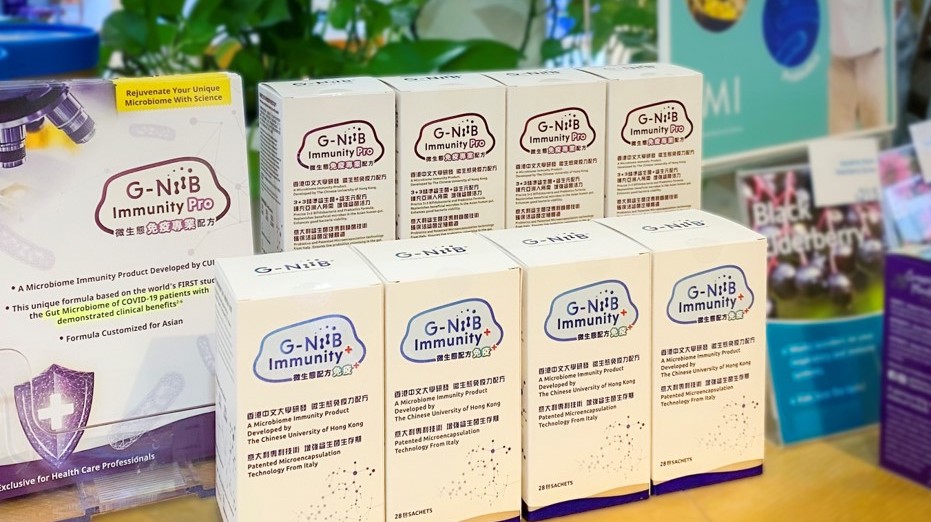
Scientists at the University of Hong Kong found that good bacteria can reduce the severity of COVID-19, the likelihood of long covid and possibly enhance your antibody response to COVID vaccinations. This led to the creation of G-Niib.
G-NiiB Immunity Pro and G-NiiB Immunity Plus are designed to tackle gut bacterial imbalances also known as dysbiosis.
Dysbiosis occurs when levels of bad bacteria outweigh the good. And - it’s a widespread issue. Research shows dysbiosis is linked to a poor response to vaccination and development of long COVID.
In a press release, Professor Francis KL CHAN, Dean of Medicine and Director of the Centre for Gut Microbiota Research at CUHK said, “Gut dysbiosis is an important marker of impaired immunity. Our findings showed 40% of Hong Kong people had evidence of significant dysbiosis comparable to that of COVID-19 patients, which is alarming to us. We should take immediate action to restore the balance in gut microbiota and help the public boost immunity.”
The G-NiiB oral microbiome immunity formulas were developed by CUHK after its world-first study highlighted a deficiency of certain good bacteria paired with an excess of bad bacteria in the guts of COVID-19 patients. More than 100 trillion bacteria live in the gut - collectively they’re known as gut microbiota. The greater the bacteria imbalance, the more severe were the symptoms during and after infection.
A deficiency in good gut bacteria Bifidobacterium adolescentis has been linked to poor efficacy of COVID-19 vaccines SinoVac and BioNTech, according to joint research by CUHK and the University of Hong Kong. Given 40% of local Hong Kongers have significant dysbiosis and 85% are either lacking or missing Bifidobacterium adolescentis, it’s critical to restore the bacterial balance, researchers advise.
Made up of three probiotics and three prebiotics, G-NiiB Immunity Pro and G-NiiB Immunity Plus replenish selected bacterial strains in the gut. Gut microbiota prime immunity and prevent the development of chronic gut imbalances. Given its clinical strength G-NiiB Immunity Pro (10 billion CFU/sachet) is a prescription-only probiotic available upon consultation with one of the naturopaths.
G-NiiB Immunity Plus (2 billion CFU/sachet) is available at our in-clinic dispensary or online. This formula is suitable for both adults and children.
For guidance on which supplement is right, please consult with one of our naturopaths – especially if you have digestive issues.
At a Glance: CUHK’s research findings
- 40% of the local population have medium to severe microbial imbalance in their gut, which also affects their immunity.
- Compared to people without COVID-19, patients had higher levels of bad bacteria like Ruminococcus gnavus, Ruminococcus torques and Bateroides dorei species. They had lower levels of good bacteria like Faecaibacterium prausnitzii, Bifidobacterium bifidum and Bifidobacterium adolescentis. The severity of the imbalance closely correlated to the severity of COVID-19.
- Bacterial imbalances in the gut persist long after the virus has left the body and are associated with ‘Long COVID’.
- 80% of recovered patients with dysbiosis suffer from at least one symptom six months on and a third suffer from more than three symptoms. Lingering symptoms include fatigue, memory loss, shortness of breath, hair loss, and sleep difficulties.
- People lacking gut bacteria Bifidobacterium adolescentis showed poor antibody response to COVID-19 vaccines.
- 57% of participants who had a poor antibody response to the Sinovac vaccine lacked Bifidobacterium adolescentis.
- Among people who took the BioNTech shot, the 25% with the lowest antibody level also lacked the bacteria.
- Bifidobacterium adolescentis is very low or missing altogether in 85% of otherwise healthy Hong Kong people.
How to increase beneficial gut bacteria Bifidobacterium adolescentis and Faecaibacterium prausnitzi and support a healthy, balanced gut microbiota
G-NiiB Immunity Pro and G-NiiB Immunity Plus contain Bifidobacterium adolescentis to restore gut microbiota, and boost immunity. CUHK’s researchers propose this may support COVID vaccine efficacy, for example when taken after booster shots.
Of course, a healthy diet is essential too. High polyphenol foods like blueberries and green tea are known to increase levels of Bifidobacteria while a high fibre diet that includes oats, wild rice, and most vegetables increases Faecaibacterium prausnitzi.
Certain prebiotics can feed both Faecaibacterium and Bifidobacterium. To avoid harming these and other good bacteria, it helps to avoid the unnecessary use of antibiotics.
If anyone is wondering if they have or are susceptible to gut dysbiosis, IMI offers gut microbiome profiling.
The GI Map can determine both the Bifidobacterial and Faecaibacterium prausnitzii levels, as well as other key beneficial bacteria essential for a healthy gut microbiota. Connect with the naturopathic team for a consultation, to learn more about testing, and for data-backed advice on which formula is best for you.
References
Chinese University of Hong Kong, CU Medicine finds new evidence for link between gut microbiome and COVID-19 severity microbiome imbalance might influence ‘long COVID’ risk, 2021
Chinese University of Hong Kong, 40% of Hong Kong people show gut dysbiosis comparable to that of COVID-19 patients CUHK microbiome immunity formula hastens recovery of COVID-19 patients and offers hope to boost immunity, 2020
Chinese University of Hong Kong, Joint CUHK-HKU study discovers efficacy of COVID-19 vaccines correlated with a probiotic bacterium, 2021
Y K Yeoh, T Zao, G C-Y Lui, F Zhang et al, Gut microbiota composition reflects disease severity and dysfunctional immune responses in patients with COVID-19, 2021
T Zao, F Zhang, G C-Y Lui, Y K Yeoh, Alterations in gut microbiota of patients with COVID-19 during time of hospitalisation, 2020
Y Su, D Yuan, D G Chen, R H Ng, Multiple early factors anticipate post-acute COVID-19 sequelae, 2022

'%3e%3cg%20id='Group_40'%20data-name='Group%2040'%20clip-path='url(%23clip-path)'%3e%3cpath%20id='Path_45'%20data-name='Path%2045'%20d='M23.55,44H20.457c-.123-.028-.245-.066-.37-.083-.736-.1-1.481-.155-2.208-.3a21.577,21.577,0,0,1-13.2-8.085,21.482,21.482,0,0,1-4.459-16.6A20.745,20.745,0,0,1,5.335,7.652,21.54,21.54,0,0,1,25.058.2,20.789,20.789,0,0,1,36.271,5.248a21.634,21.634,0,0,1,7.392,12.913c.136.757.226,1.523.337,2.284v3.1c-.094.692-.167,1.387-.287,2.074A21.768,21.768,0,0,1,36.981,38.1a21.477,21.477,0,0,1-11.108,5.555c-.77.136-1.548.229-2.323.341M9.457,21.975c0,1.776-.039,3.553.011,5.327a7.607,7.607,0,0,0,1.453,4.542,7.129,7.129,0,0,0,5.74,2.691c1.931.078,3.865.113,5.8.084a54.556,54.556,0,0,0,6.3-.278,6.248,6.248,0,0,0,5.388-4.6,11.62,11.62,0,0,0,.441-3.692c-.018-3.407-.033-6.816-.133-10.221A6.349,6.349,0,0,0,33.06,12.1a7.045,7.045,0,0,0-5.8-2.651c-3.506-.057-7.014-.04-10.521,0a7.593,7.593,0,0,0-4.267,1.231,7.01,7.01,0,0,0-3,5.967c-.064,1.773-.013,3.551-.013,5.327'%20fill='%23fff'/%3e%3cpath%20id='Path_46'%20data-name='Path%2046'%20d='M21.981,11.566c1.971.066,3.932.089,5.887.21a4.372,4.372,0,0,1,4.338,4.356c.123,3.145.12,6.3.12,9.446a14.831,14.831,0,0,1-.267,3.11A4.215,4.215,0,0,1,27.911,32.2c-3.187.111-6.379.117-9.569.119a14.288,14.288,0,0,1-3.024-.261A4.206,4.206,0,0,1,11.8,27.916c-.112-3.175-.121-6.354-.121-9.532a14.84,14.84,0,0,1,.272-3.11,4.249,4.249,0,0,1,4.12-3.495c1.969-.119,3.945-.146,5.909-.213m6.487,10.447a6.466,6.466,0,1,0-6.475,6.448,6.429,6.429,0,0,0,6.475-6.448m.287-5.26a1.508,1.508,0,1,0-1.515-1.486,1.515,1.515,0,0,0,1.515,1.486'%20fill='%23fff'/%3e%3cpath%20id='Path_47'%20data-name='Path%2047'%20d='M21.983,26.2a4.211,4.211,0,1,1,4.229-4.169A4.193,4.193,0,0,1,21.983,26.2'%20fill='%23fff'/%3e%3c/g%3e%3c/g%3e%3crect%20id='Rectangle_1422'%20data-name='Rectangle%201422'%20width='46'%20height='46'%20fill='none'/%3e%3c/svg%3e)